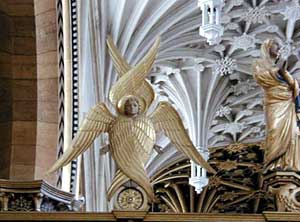
|
||
|
|
Basics
Start Here
Anglicans Believe ...
The Prayer Book
The Bible
News
News Centre
News Archive
Newspapers Online
Official Publications
Resources
Resources A to Z, including
Biblical Study
Book of Common Prayer
Books and Magazines
Exchanges
Events
Liturgy
Music
Religious Orders
Preaching
Theology
Youth
Worldwide Anglicanism
Anglican Communion
In Full Communion
Not in the Communion
Dioceses and Parishes
Africa
Australia
Canada
England
Europe
Ireland
Japan
New Zealand
Scotland
USA
Wales
World
Anglicans Online
Archives
Add a Site to AO
Tell Us What You Think
Link to AO
Staff
Awards and Publicity
Beginnings, AO Today
Our Sponsors
Hallo again to all.
Two utterly unrelated recent events joined to form our letter this week. The first was our receipt of this thoughtful letter:
I have been a Christian for about 20 years and have recently started going to an Anglican church. For many years I was part of a charismatic church, but have gradually become disaffected with that. I really enjoy the Anglican service, but wonder about some of the rituals etc. that are used; for example, why incense and candles, why always using a 'set' service, why particular creeds. [I ask] to gain a fuller understanding so that I may enter into what is happening more fully. So I wondered if you could either answer such questions or point me to a resource that may be able to answer these questions.
 The
second was our stumbling across a large science-fiction fan convention. At noon, whilst waiting
near delegates to that convention in a queue for a lunch table, the group in front of us were all dressed as Empire troopers from Star
Wars, and many of the people in behind us were wearing otherworldly outfits and carrying portable electron-beam and phaser weapons. Rituals
and ritual language abounded.
The
second was our stumbling across a large science-fiction fan convention. At noon, whilst waiting
near delegates to that convention in a queue for a lunch table, the group in front of us were all dressed as Empire troopers from Star
Wars, and many of the people in behind us were wearing otherworldly outfits and carrying portable electron-beam and phaser weapons. Rituals
and ritual language abounded.
We are certain that there is a very deep human need for ritual, that ritual binds us to one another and to the past in a way that almost nothing else can. We were very sad that the delegates to the science-fiction convention felt no need or desire to share rituals with the Communion of Saints, and we were too hungry to ask a pack of storm troopers, still wearing their white full-face helmets, if they had ever wondered if The Lord was anything like The Force or The Prime Directive.
People have a deep need for ritual, so much so that they invent their own if they don't find it. We read these wise words long ago:
The appetite for the symbolic is never satiated. Whether this implies the existence of a supernatural reality, or not, is not a matter one can argue about. If one at least admits supernatural reality—or whatever one may call it—as a hypothesis, one may more easily consider why it is that purely aesthetic symbolism and ritual can increase the hunger for the numinous to a point where it becomes raging.
The reason appears to lie in the difference between the candles lighted on the dinner-table and the candles lighted on the altar. The difference is none the less real because either may provoke, from someone lacking all sacramental sense (or rather, fiercely suppressing it) the question: 'What are all the pretty candles for?' Either set of candles can, of course, be beautifully justified as being no damned use to anyone. But that is not quite the point. The one symbol is undefined, non-committal, and the other refers explicitly to the pattern of man's condition, which is grounded in the desire and pursuit of the whole. Regardless of one’s 'believing in God' or otherwise, symbols are more satisfying the more explicitly they refer to the ultimate, to the whole.*
We are writers and editors, not priests; we are not trained in the planting, growing, or nurturing of churches and congregations. But it seems to us much easier to steer people between variants of the same activity than it is to start them on such in the first place. The online world is full of people with a demonstrated love of ritual. We've started thinking about how to attract them to our parishes, and we welcome your suggestions and comments.
See you next week.
 |

|
| Cynthia McFarland cmcf@anglicansonline.org |
reid@anglicansonline.org |
Last updated: 2 September 2001
URL: http://anglicansonline.org/
*Eithne Wilkins, The Rose-Garden Game, the Symbolic Background to the European Prayer-Beads (1969).